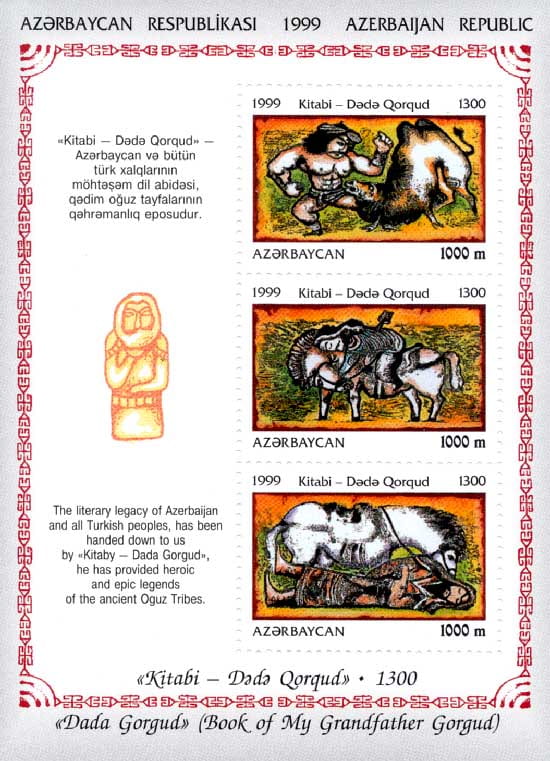Turkey, Azerbaijan, Turkmenistan, Kazakhstan, Kyrgyzstan
Oral tradition: 9th-10th century CE
Earliest written versions: late 13th century – 14th century CE
The Book of Dede Korkut
Introduction commissioned.
Name of Contributor
University Affiliation
Works Cited
List of works cited, if applicable.
Resources
Recommended Editions:
Geoffrey, L. (1974), The Book of Dede Korkut, London: Penguin Books Ltd.
Sümer, F., Ahmet E. U. and Warren S. W. (1991), The Book of Dede Korkut: A Turkish Epic, Texas: University of Texas Press.
Critical Studies:
Adil, N. (1990) A Critical Analysis of the Theme of the Heroic Ideal in Beowulf and The Book of Dede Korkut, Ankara: Hacettepe University.
Anikeeva, T.A. (2019), “The Oghuz Epic Stories in the Seljuk Era”, History, Archeology and Ethnography of the Caucasus, 15/2, 110-117.
Azmun, Y . (2020). “The New Dädä Qorqut Tales from the Recently-Found Third Manuscript of the Book of Dädä Qorqut”, Journal of Old Turkic Studies, 4/1, 16-27.
Başgöz İ. (1978), “Epithet in a Prose Epic: The Book of My Grandfather Korkut”, in Studies in Turkish Folklore Studies of Turkish Folklore (Ed. Ilhan Basgöz and Mark Glazer), Bloomington, 24-45.
Burrill, Kathleen R. F. “Karajuk, Mini-Hero of a Dede Korkut Story,” in Proceedings of the Thirty-First International Congress of Human Sciences in Asia and North Africa (Edited by Yamamoto Tatsuro), Tokyo: Toho Gakkai, 541-542.
Can, D. T. and Metin E. (2010), “The Book of Dede Korkut: The Villains In and Out of Turks”, in Villains, Heroes or Victims? (Edited by Dana Lori Chalmers), Oxford: Inter-Disciplinary Press.
Conrad, J. A. (1999), “Polyphemus and Tepegöz Revisited A Comparison of the Tales of the Blinding of the One-eyed Ogre in Western and Turkish Traditions”, Fabula, 40/3-4, 278–297.
Dankoff, R. (1982). “‘Inner’ and ‘Outer’ Oğuz in Dede Korkut”, Turkish Studies Association Bulletin, 6/2, 21-25.
Düzgün, H. T. (2009) “The Alp (Hero) and The Monster in Beowulf and The Book of Dede Korkut”, Hacettepe Üniversitesi Türkiyat Araştırmaları (HÜTAD), 11/11, 109-117.
Hamarat, S. (2019) Cultural Norms in the Translation of Dede Korkut Stories into English, Master Thesis, Ankara: The Institute of Social Sciences at Gazi University,
İz, F. (1991), “Dede Ḳorḳut”, in Encyclopaedia of Islam, Second Edition (Edited by P. Bearman, Th. Bianquis, C.E. Bosworth, E. van Donzel, W.P. Heinrichs.), Leiden: Brill Academic Publishers.
Meeker, Michael E. (1992), “The Dede Korkut Ethic”, International Journal of Middle East Studies, 24/3, 395–417.
Mirabile, P. (1990), The book of the Oghuz peoples, or, Legends told and sung by Dede Korkut, Paris: Voies Itinerantes.
Özkartal, M. (2012), A General View Over Animal Symbolism in Turkish Epics (Samples from the Book of Dede Qorqud). Milli Folklor , 58-71.
Rzasoy, S. (2010) “The Book of Dede Gorgud: A Masterpiece of Epic Literature”. (Date Accessed: 03.07.2020)
Sümer, F., Ahmet E. U. and Warren S. W. (1991), The Book of Dede Korkut: A Turkish Epic, Texas: University of Texas Press.
Taşdelen V. (2015), “On the Meaning of Name in Plato’s Cratylus Dialogue and the Epic Tales of Dede Korkut”, Journal of Arts and Humanities, 4, 71-81.
The above bibliography was provided by Emrah Pelvanoglu, Yeditepe University, Turkey.
Dede Korkut Kitabı’nın Dresden Şehir Kütüphanesi nüshasından bir sayfa. The front page of the 16th century Dresden Manuscript.
Heritage of Dede Qorqud / Korkyt Ata / Dede Korkut, epic culture, folk tales and music. Turkey, Azerbaijan, and Kazakhstan. Inscribed in 2018 on the Representative List of the Intangible Cultural Heritage of Humanity, UNESCO. This website contains information and short videos (including performance) concerning the heritage of Dede Korkut.

